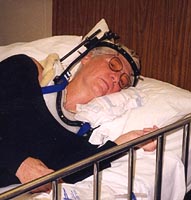 |
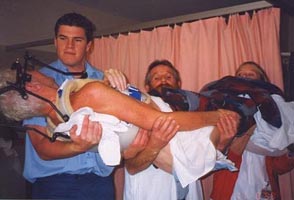 |
This article is about a very special person
named Charlie Hedbring and his Rat Terrier, Coogee. Charlie had a terrible
sporting accident that initially left him a quadriplegic. Thanks to his
own determination and the help of “Sir Coogee,” he has made a remarkable
recovery over the past four years. Charlie has been kind enough to let
the NRTA use some of his writings about his ordeal to provide some insight
into the Rat Terrier as a breed and as a potential rehabilitation therapy
pet. It is not only informative, it’s entertaining. Thank you
Charlie and Sire Coogee.
 |
 |
"Coogee is now a TV star!" says Charlie. "The
Albany, NY TV Channel 9 did a story on my rehab and of course ratter Coogee
stole the bloody show. The TV crew came for 35 minutes to do the 3 minute
block and stayed 2.5 hours! They loved ‘The Coog’. And with good reason.
Coogee is why I am out of the wheelchair and back on my feet."
You can see a video of the TV interview
on Sir Coogee’s website at www.sircoogee.com.
An excerpt from the interview is presented below.
Health Team Hero: Charlie
By: Marcie Fraser, TV Channel 9, Albany, New York
 |
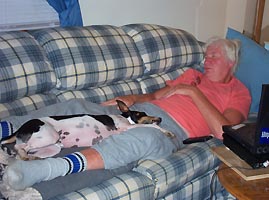 |
“Charlie Hedbring was vacationing in Australia. On roller blades, skating fast, he crashed. He fractured his fifth and sixth cervical vertebra, and suffered a blood infection that immediately attacked his spinal cord.
“In the last four years, he has spent nearly three years in a wheelchair. He's where he is today because of his daily hours of physical therapy. In addition, perhaps Charlie’s most effective therapy has been his doggie, a feisty impatient rat terrier named Coogee.
“Charlie and Coogee spend hours every day exercising
in many ways. Although this may seem like mere dog’s play, it's been paramount
to Charlie's physical and mental rehab. "He’s wonderful,” Charlie
grins. “He gives me such motivation. He gets me up in the morning and keeps
me busy. Even at 9 or 10 o’clock at night when my chronic pain is the biggest
problem he makes me go out for one last walk – or two.” Daily walks and
playing ball forces Charlie to rebuild muscles he needs for walking and
coordination. Sir Coogee takes him into the nearby woods, makes him hit
waffle balls to chase, insists that Charlie cook for him twice a day, accompanies
Charlie on most shopping trips, and has even learned to ride on the back
of Charlie’s three-wheeled motorcycle trike. As Coogee goes, so goes Charlie
in so many ways.”.
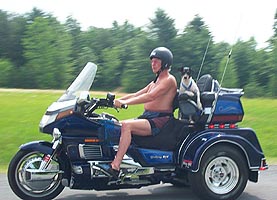 |
**************************************************************************************
Coogee has also finished up a piece of
writing on pet rehab therapy for his doggie website. Readers can access
the information at sircoogee.com/petherapy.htm.
In that article, Coogee offers bowls of practical advice for other doggies
who want to be rehab therapy assistants. As Coogee is quick to point out,
the job is 24/7 and demands a lot from doggies. “It isn’t easy getting
along with our Sugar Daddies and Sweet Mommas” (Coogee’s term for us types
who depend on, love dearly, and thus cater to doggie’s every whim!).
Coogee has a host of suggestions on how his fellow blokes and mellow mate doggies can help out those in great distress. His website focuses on those with spinal cord injuries. However, the suggestions make a lot of sense for others as well, including the severely handicapped, aged, those with depression, stroke victims, the homebound, amputees, and on and on. Below are some excerpts from his page but, again, you can enjoy the entire piece on Coogee’s website.
And Now for Sir Coogee's Point of View...
My name is Sir Coogee. I live in Saratoga Springs, New York, about two hundred miles north of New York City. As mentioned, in early 2003 I was featured on Channel 9 TV in Albany, New York as my Sugar Daddy’s rehab therapy pet. My SugDad (short for Sugar Daddy) also features me in his book, Silent Tears, Solemn Hope. In the book he gives me perhaps too much credit in his five-year battle to walk again after a severe spinal cord sports injury initially left him a totally helpless quadriplegic.
These days I am his constant companion. I am with him whenever he visits his doctor, or the Albany Medical Center, Saratoga Hospital, MRI Clinic, the bank, post office, Lowe’s, Home Depot, and just about anywhere where food is not sold. Indeed, I am with SugDad 24/7 and love most every moment. My therapy role in his rehab is briefly sketched out below and I sure hope you find my thoughts useful and interesting.
I know what’s happening, believe me I do. When it comes to catastrophic physical injuries (CPI) and the mental hassles that go hand in hand with CPI and SCI (Spinal Cord Injury), I know a whole lot about how we doggies can assist the all-too-long rehab struggle. You are fighting a lonely battle, I know. Your loved ones try their best to improve your plight. But you and I both know they have their own problems, their own worries, their own struggles to overcome day in and day out.
So believe me when I say that my pet mates and I are eager to offer relief to SCI Battlers. We are therapy motivators. We want to make your world better for you. We want you happier. We want you to be eager to wake up, quick to get up, resolved to stay up, and reluctant to retire. To cope is to win and we are dedicated to helping you win, to finding pockets of happiness and solace every single rehab day for as long as it takes.
In my case, SugDad is now walking without crutch, cane, or braces. He drives a car, mows his lawn, shovels snow, rakes leaves, walks up and down stairways, does his own grocery shopping and on and on. And all this after nearly three years in a wheelchair, after devastating muscle deterioration, after gaining fifty-two pounds, after attempted suicide, and even after his family was told he would never walk again. Easy for him? Hell no. That’s where we rat terriers come in. That’s why we are 24/7 therapy pets. That’s why we’re domestic partners. That’s why we ratters make great physical and mental rehab assistants.
Why a Therapy Doggie?
Of course you want to speed your recovery. Of course you want to better tolerate your rehab. We ratters can help you lots. We 24/7 therapy dudes can contribute to your rehabilitation battle in at least the following important ways.
1. Companionship – We doggie pets make jolly good domestic partners. No arguments from us when you have a bad-mood day. Want to rattle around outside in your powered wheelchair? No worries, we are eager and happy to oblige. Want a neat bedmate who will keep you toasty warm? Well, we are the absolute best in bed! Companionship? You got full-time company with pets. Cats are great if you are bed-ridden, wheelchair bound, prone to frequent illness, or are quite unstable on your feet. Otherwise, may I suggest one of us rat terrier doggies, pretty please? We will prompt more physical activity on your part. And we come in a variety of flavors as you will discover shortly, much to your unbridled delight.
2. Low maintenance – We rat terriers, like several other doggie types mentioned on my website, are easy to live with. We are small in size, lightweight, easy to handle, don’t eat a lot, have short hair, are very sturdy, hardy, healthy and agile, and we are quick learners.
3. Motivation – We ratters will keep you busy. We will give you all kinds of neat reasons to get outta bed in the morning; to get outta the wheelchair if possible; to get off the couch one more time; make one last evening trip outside. Our goal is to give you ample reasons to stay active – and happier.
4. Entertainment – We ratters are fun! Regardless of when born, we are your Leo. We love center stage, love to perform, are delightfully self-confident, are very proud, are loyal nearly to a fault, and we are high achievers.
5. Conversation – Talk all you want, we listen. Want to have a bit of a gum flapper? Babble on, mate. We are all ears. Want to have a little cry now and again? We understand and will snuggle up with you as long as you want. Having a bad pain day and need to holler a bit. Go for it: Seldom do we argue, disagree, or even complain. We may sneak a quizzical look your way, but we’re cool.
6. Understanding – Want to know what is the best of all about us ratters? We know stuff. We know what’s happening. We know you SCI Battlers. When you are cranky or cordial, we know. If you are tired, in pain, having spasms, frustrated, anxious, depressed, or need to get up and move, we know. Whatever your physical condition or mental state, we just know how tough it is. And we will always be there beside you, up under your arm, snuggled between your legs, tight up against your feet. We are always there for you, helping you cope in your courageous comeback fight against the catastrophic personal injury that so cruelly struck you down.
7. Compassion – We care about you. A lot. We are not latchkey doggies. We are 24/7 domestic partners. We sure do love to care heaps about you. I adore my SugDad. More importantly, let me also say this: If you adopt a rescue doggie (or kitty), you will be even more loved, more appreciated, more protected. Rescue pets will bring you unequaled devotion, loyalty, and faithfulness. We breeder-babes will dearly love you for sure. But heaven hath no love like a doggie or kitty rescued from cruelty or abandonment. Either way, we all bring to you a degree of compassion that you will grow to cherish.
8. Depression antidote – We therapy doggies are walking 24/7
anti-depressants. Lean on us!
• Low on energy?
We will perk you up!
• Lacking motivation?
We will fire you up!
• Getting out of
bed seems pointless? We will get you up!
• Seeing the cup
as half empty? We will fill it up!
• Exercising too
much of a hassle? We will make it playful!
• Serotonin-‘challenged’?
We will make this brain chemical hum! We know serotonin plays an important
role in fighting depression. We know that Paxil is a prescription drug
that treats depression by raise the brain's levels of serotonin. Well,
consider us your Paxil-supplement. We will do our best to make you feel
that our presence alone raises your happy serotonin level. We’ll ensure
a happy haven.
• Melatonin-overloaded?
We will help make this brain chemical chill out a bit. Yup, we therapy
doggies know that melatonin production rises as the sun goes down, darkness
kicks in, and you wind down. You begin to feel less alert. Body temperature
starts to fall. Sleep seems more inviting? Not a chance! If you allow,
we can become your melatonin’s worst enemy!
• Rainy days get
you down? "Sunshine hitting the retina of the eye produces mood-enhancing
neuro chemicals in the brain," says New Jersey psychologist, Dr. Farrell.
"That makes you feel good." My own experience with SugDad is that sunny
weather is feel-good weather all over your entire body. Not just the eyes.
So SugDad loves to bask in the sun. I do too. We doggies will get you SCI
Battlers out in the sun a lot. And we will pump up your mood when those
gloomy clouds do come. SugDad calls me his “Prince of Glee.” Woof!
9. Protection and security – A doggie’s ears never sleep. If
anything moves, we hear it. If we hear it, you will know. We rehab doggies
are territorial and we know the boundaries. No unwanted dude messes with
you battlers when we’re around!
 |
My friend, Noodle, is a great example. SugDad was bed-ridden for months and months before I showed up. The second smallest of the four rat terrier sizes (around 15 lbs), Noodle’s owners would drop him off daily at SD’s apartment when they left for work around 3pm or so.
As I hear SugDad tell it, Noodle would stay
in bed with him and bark if anyone approached his door. If SD buzzed open
the apartment door, Noodle would bark or growl and worry about asking questions
later.
Whomever Noodle decided was in the “social loop” would eagerly get
hugs and kisses. Everyone else was dagger-eyed with a stare that backed
them off until Noodle felt there was no threat to then-helpless
SD. We rat terriers don’t mess around! Remember, we like people but
we love you. The difference to us is not trivial.
10. Exercise -- If you have an active therapy pet doggie like me, you really have no choice but to improve -- a lot. I, for example, expect a lot from SD and I work hard to ensure he rehabs day in and day out, rain or shine.
SugDad gets heaps of exercise just playing with me. Hitting dozens of waffle or foam balls with a foam-covered bat. Walking through the snow, or rain, or leaves. Picking up all my toys, giving me weekly showers, rough housing in bed with me every day, cooking all my meals, grooming me daily (it’s a big deal with him – my Sugar Daddy!). All of this and much more are great for his balance, coordination, motor dexterity, stamina, and self-confidence. Just think of all the motor and muscle exercise involved. Just think of how great all the daily activity is mentally for any severely injured person trying to regain lost abilities. True, SD did spend much of every day resting, sleeping, and keeping his hurtin’ legs up on the couch. For many many months he tired easily and quickly. He did use to tire easily. But little by little the months went by and his strength trickled back. Now, in mid-2003 and four years into his five year rehab plan, his gains – mental as well as physical – are little sort of miraculous.
My SugDad loves to give me my exercise, believe
me. While not all ratters are as hyper as I am, generally we are a lively
breed. In my case (SD claims I am clinically diagnosed as super hyper-active!),
virtually every day in the morning I race behind his car for nearly a quarter
mile at a time. I am so eager to run that I actually shake, quiver, and
whine softly as we approach the stretch of road where I am allowed to leap
out of the car and just run, run, run. My top speed is nearly 30 mph when
I’m fresh. My cruising speed is a steady 22-25 mph. (Hey, I ain’t no Greyhound,
you know!) One of my major rehab roles – chasing and retrieving kicked
and hit waffle balls – is good exercise for me as well. Gosh, I must say
that my fetching ability has really allowed SD to really work hard on his
body balance and muscle coordination.
 |
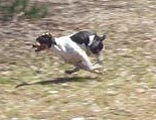 |
Therapy Pet “Training”? No way!
Doggie training you ask? I don’t think so! Have you ever attended dog-training “school”? Guess what: Have you noticed that very little attention is focused on us doggies. The fact is that it is you poor blokes who are spoken to, addressed, lectured, trained. Not us. We are pretty much there for demo purposes only. The truth is that someone is making a lot of money training you all to believe that we are as dumb as nails. Heck, we doggies know how to be clean, to be orderly, be kind, polite, be quiet most of the time, be energetic, be thoughtful. Except for a very few bad-ass doggies, our specie truly is “man’s best friend.” Believe me, pets need little or no “formal training.” Just a bit of logical interaction will do.
If you dudes demonstrate communication competence,
we doggies demonstrate behavioral compliance.
If you know what to say, when to say it, and how to say it, our resulting
behavior is almost always impeccable. Verbally cue us correctly and we
will behaviorally respond correctly. Almost always.
The key term here is “auditory discrimination”. It is so very important to us 24/7 pet partners that you please vary your voice. Soft, gentle, soothing voice tones together with a stroke or pat will quickly teach us all that is correct. SugDad has never rewarded me with bits of my favorite food when I acted correctly. No need to. Voice tone, a smile, and a loving pat are all I need. An abrupt, loud “No!” and a deep frown are all we doggies need to learn “Oops, best not do that again.” No need to yell and scream and carry on like a wombat in heat. It’s never necessary.
For example, my Sugar Daddy uses only three
negative cues with me: “No!” “Stop!” “Wait!”
Furthermore, he uses those three cues sparingly. Why? So they don’t
lose their effect. But on those few times a month when he does negatively
cue me, his voice is strong, firm, loud, curt, blunt and totally different
than at any other time he talks to me. So I know by voice tone alone he
means business and thus it must be critically important that I listen.
So I comply. All other verbal cues SD uses are positive.
So, if you verbally cue us rat terriers correctly, we will respond correctly in our behavior. What do we mean by “correctly”? It’s Simple.
Just remember and use the “4 C’s of Correct Cueing:
1. Cue Contingently – if (and only if) we perform a specific
desired behavior, then give us feedback.
2. Cue Contiguously – give us the contingent good-boy or bad-boy
feedback immediately.
3. Cue Consistently – give us the same contingent (if…then),
immediate we-are-right or we-were-wrong feedback.
4. Cue Continuously – always give us the same contingent
immediate feedback, regardless of time, location, activity, or circumstances.
All together, now: Routine, routine, routine! Sameness. Repetition. Repeated practice. Time and time again. The best predictor of future behavior is past behavior. Lots of practice makes us look pretty good in no time flat. We make great rehab therapy domestic partners.
Rehab Therapy Pet? Yes or … Yes!
Stroke. Amputation. Home invasion. Brain injury.
Clinical depression. Diving accident. Drunk driver. One psychosis or another.
Chronic illness. Sports injury. Rheumotoid arthritis. Severe home
mishap. One of the main themes of the book, Silent Tears Solemn Hope,
is this: the chances indeed are that we will get struck down by a major
catastrophe at some point. The subsequent physical and mental rehabilitation
will be long and hard. Do you want to battle back alone? As Coogee and
Charlie prove, a pet rat terrier as a therapy assistant can bring comfort,
support, motivation, and understanding. Get a pet. Better yet, get a doggie.
Best of all, get a rat terrier.
Author: Charles Hedbring